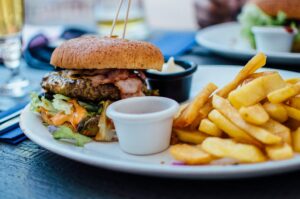Our culture adores times with food. We are surrounded by delectable delights on all occasions, from football games to celebrations. During the holidays it is easy to overeat. Thanksgiving, Christmas, and Easter are all times when families typically gather and prepare large feasts. But what if overeating isn’t a matter of an occasional feast? Binge eating, also known as compulsive eating, is the urge to continue eating past the stomach feeling the sensation of fullness.
This compulsive behavior is warned about in the Bible and is detrimental to our health. How do we stop once we start eating? How do we control the urge to eat when we are stressed or feeling another emotion like happiness?
The Skinny on Compulsive Eating
 Binge eating, or compulsive eating, is the uncontrollable urge to continue eating past fullness. It is so common in the United States that the behavior is recognized as Binge Eating Disorder and classified under eating disorders.
Binge eating, or compulsive eating, is the uncontrollable urge to continue eating past fullness. It is so common in the United States that the behavior is recognized as Binge Eating Disorder and classified under eating disorders.
An overeating disorder causes the person to look for comfort in food. Unlike other vices such as alcohol, cigarettes, and drugs, food is something that always surrounds us. You cannot quit food cold turkey. We must eat to survive.
The problem with compulsive eating is that a large amount of food is consumed in one sitting during an overeater’s meal. It is common for this person to skip breakfast, eat a healthy lunch with friends, eat dinner with the family, and then eat thousands of calories worth of food after everyone in the household has gone to bed.
Frequent trips to the fast-food drive-thru can result in the binge eater consuming the food in secret and discarding the food wrappers to keep their family from knowing how much they ate. A binge is often followed by feelings of guilt and shame. The person feels that they are out of control. Yet, they may find it difficult to ask for help from others.
Although our culture celebrates with food, it praises those people who remain thin and active – and points an accusing finger at those who are overweight, obese, or have an overeating disorder. The out-of-control feelings may cause the overeater to try methods to control their weight after a binge, such as vomiting, starving, or laxatives. This behavior can lead to other eating disorders like bulimia.
 How do you know if you are falling under the binge-eating behavior? The urge to eat is compulsive. You are not physically hungry, nor do you feel acid in your stomach to let you know it is empty. Your stomach isn’t growling or making any sounds from the acid that is released to signal to your body that you need to eat. Instead, the behavior is about finding something to fill a need.
How do you know if you are falling under the binge-eating behavior? The urge to eat is compulsive. You are not physically hungry, nor do you feel acid in your stomach to let you know it is empty. Your stomach isn’t growling or making any sounds from the acid that is released to signal to your body that you need to eat. Instead, the behavior is about finding something to fill a need.
A person must have an episode at least once a week for three months before a diagnosis of binge eating can be made from a medical professional. They eat until they are uncomfortably and painfully full.
It is not uncommon for an overeater to have trouble breathing or staying awake after a binge. The pain from forcing more food into their stomach can leave them reaching for over-the-counter medications to relieve the discomfort.
So why do we struggle with compulsive eating? For the temporary pleasure sensation released by our brains. The compulsive behavior triggers the release of certain neurotransmitters that control feelings of pleasure, satisfaction, and comfort.
The behavior can also inhibit the region of the brain that controls decision-making in how much we consume. Just like with any eating disorder, the behavior can lead to life-threatening conditions.
What the Bible Says About Gluttony
If you are a Christian believer, then you know that God created our bodies in His image. His word warns us about doing things that can have a detrimental effect on the human body. This includes drinking too much, having sex outside of marriage, using obscene language, and overeating. The Bible mentions gluttony as a form of greed and not to give in to it (Proverbs 23:2). It is the greed for food, to want to consume more than is allotted or allowed by our bodies.
Just like no one sets out to develop an addiction, compulsive eating and gluttony are created from behaviors. Do you feel now, or as a child, that food was scarce in your household? Was your family large and if you didn’t get yours, then it might not be there later?
 Did you grow up in a household where you were expected or rewarded to “clean your plate” at dinnertime? Perhaps you were given ice cream or some other dessert after you’d eaten all your dinner. Even if you weren’t hungry, you may have eaten the dessert as a reward. These are learned behaviors.
Did you grow up in a household where you were expected or rewarded to “clean your plate” at dinnertime? Perhaps you were given ice cream or some other dessert after you’d eaten all your dinner. Even if you weren’t hungry, you may have eaten the dessert as a reward. These are learned behaviors.
In ancient times, people had to hunt and gather their food. They spent all day preparing the food and ate when they could. Sometimes they had to go for some time between meals depending on the season and the condition of the land. Today, we have restaurants in every town across the country and grocery stores packed full of locally and imported foods. In this case, more is not better.
Our bodies can only use so much fuel, so what happens when we continually overeat? The stomach is a small organ, a bit larger than a person’s fist. It is made of muscles that allow it to expand. However, when you binge eat on a consistent basis, the stomach never gets a chance to regain its natural shape and is continually stretched.
The valve at the top of the stomach that connects the esophagus becomes weakened. This can allow acid to move from the stomach into the esophagus tube and create acid reflux and heartburn, especially when you lie down.
Other organs within your body must work harder to help break down the excess food, not only for the fuel your body can use but for the excess storage (fat accumulation) it creates with the unused fuel.
A compulsive eating disorder can lead to conditions that can be fatal. Heart disease, Type II diabetes, high blood pressure, high cholesterol levels, and other conditions can arise from binge eating. Gluttony in the Bible is a warning for people to beware of the behavior.
Compulsive Eating Disorder Treatment
If you feel that your behavior falls within the Binge Eating Disorder criteria, seek help from a licensed mental health care professional. There are therapies available to help reframe your thoughts and behaviors to go longer between overeating episodes until they become a rare occurrence. You will uncover the triggers that cause you to have an emotional dependence on food and learn how to effectively handle your stress without turning to food.
 A therapist may introduce you to Cognitive Behavioral Therapy (CBT). This therapy is used for various mental health conditions but is often applied in a three-phase approach to eating disorders. You will share with the therapist about your emotions and behaviors and they will offer suggestions and education about new healthy behaviors.
A therapist may introduce you to Cognitive Behavioral Therapy (CBT). This therapy is used for various mental health conditions but is often applied in a three-phase approach to eating disorders. You will share with the therapist about your emotions and behaviors and they will offer suggestions and education about new healthy behaviors.
Secondly, you will learn how to identify and reshape negative thoughts and emotions and apply these techniques. Finally, you will work on healing your body and your mind through these methods. You will rebuild your self-worth and become confident in the future.
You can also train yourself to approach a meal with thought and control. Plan your meals ahead of time. When you sit to eat, take your time. Turn off all distractions and focus on the meal at hand and the people sharing the meal with you. Staying mindful during a meal can help you more easily feel when your stomach is full and stop eating when you are satisfied.
If you choose to use the services of a faith-based counseling facility, the therapist can help point you to what your heart might really be looking for when your body is searching for food to fill a need. God created us to yearn for Him. We have a need within our hearts that only He can fill. In sin, we have learned to fill that hole with food for comfort and satisfaction. Now is the time to take control of our health and rebuild our bodies and our spirits.
Prayer for Self-Acceptance
Dearest Father God, in humility, I come to you, to ask you to help me accept myself as I am. I often criticize myself so badly, compare myself to others, that I often feel like I hate myself. I also don’t like what I see in the mirror. These bad thoughts about myself make me feel small, resentful and unworthy of your love which makes me unable to contribute the beauty of my soul.
Please help me to love myself as I am. To see myself as you see me. Please help me to accept my body with all its beauty and perfection just the way you made it. Give me the knowledge and the wisdom to know how to protect and keep it safe and healthy. Help me to never compromise my integrity, to be authentic, truthful and honest in everything that I never again need to reject myself or sabotage my own happiness.
From now on, let every action, every word, every reaction, every thought, and every emotion of mine, be based on love. Help me, my dearest Father, to trust you fully. Let the power of your love break all the lies I was programmed to believe, all the lies that tell me I am not good enough, not strong enough, smart enough, I am not rich enough, that I cannot make it.
Let the power of your love be present in my whole being that I see myself and everyone through the eyes of your love. Help me that I no longer need to live my life according to other people’s expectations, but by your will.
In Jesus Name,
Amen
“Pancakes”, Courtesy of Ash, Pexels.com, CC0 License; “Burger”, Courtesy of Robin Stickel, Pexels.com, CC0 License; “Mediterranean Dinner”, Courtesy of Flo Dahm, Pexels.com, CC0 License; “Pizza”, Courtesy of Brett Jordan, Pexels.com, CC0 License


